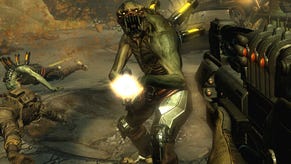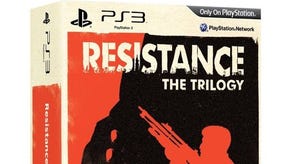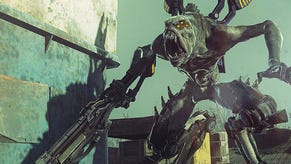Resistance 2
Fight the good fight.
In the great console wars of the 21st century, the exclusive first-person shooter is an elite paratrooper regiment, pushing deep behind enemy lines, paving the way for the long-term advances, claiming back enemy territory and banging the propaganda drum every step of the way. Resistance: Fall of Man, launched with the PS3, wasn't quite up to the job. It was a good soldier, but not an inspirational leader.
So when you fire up Resistance 2, you may find yourself checking the box to make sure you've got the right disc. It's so different to its predecessor in so many beneficial ways that it's almost an entirely new game. Picking up the story of Nathan Hale, a US soldier fighting back against the mutated Chimera menace in an alternate history where World War II never happened, it wastes no time transporting him from the rubble of Britain, via an unscheduled stop in Iceland, to the new battlefront: America.
It's a change of scenery that seems to have inspired developer Insomniac. As amusing as it was to begin in Grimsby and Manchester, there was always a suspicion these alien suburban locations didn't click with the Californian devs. The result was a grey game, made up of monochrome rat-runs through scenery that - cathedrals and other controversial landmarks aside - could have come from any documentary about the Blitz. Here you're dropped into rich, realistic environments that immediately impress. The detail level is high, and everything - from incidental objects to character models - is more alive and immersive. These new HD vistas, populated by characters that talk and move like real people, reminded me almost straight away of Half-Life 2.
Control, too, has been completely overhauled. Primary and secondary fire is now mapped to the right shoulder buttons, with iron-sight aiming on L1 and L2 pulling double duty for both crouching (a quick tap) and sprinting (hold it down). Response feels faster, and the game's pace has increased to match the slicker interface. Weapon selection has also changed, with Hale now restricted to just two firearms at a time. Even the health system has been revised, although this is disappointing, since the original game's traditional health bar, divided into separately recharging quarters, was one of its best ideas. It's a shame to see it replaced with yet another encroaching red mist to warn of impending death that dissipates after a few seconds' rest.
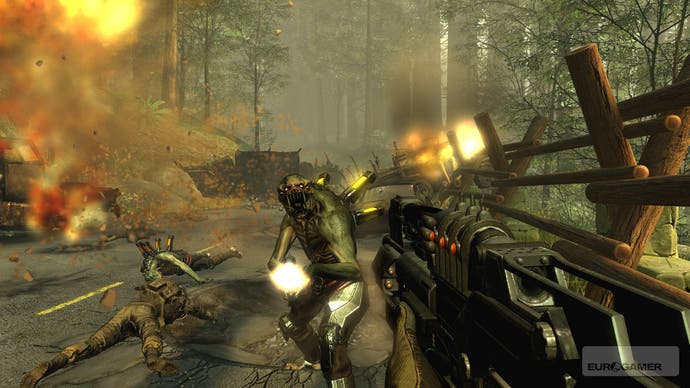
It's traditional, of course, for shooters to showcase their evolution through new enemies and weapons, and Resistance doesn't disappoint on that front. In terms of new firepower, you get a well-balanced selection of human and Chimeran guns to play with, any of which will get you out of a tricky spot. Mainstays such as the Carbine, shotgun and sniper rifle all return, slightly tweaked, while some of the more popular Chimeran weapons also reprise their role. The Bullseye, for shooting around corners, is back along with the Auger, which can shoot through obstacles.
It's the new weapons that prove most interesting, however, and Resistance 2 can claim a special prize for having a desirable pistol. A powerful Magnum, it not only kills smaller foes with one shot, but the explosive bullets can also be detonated remotely. Given the game sometimes throws an astonishing number of enemies at you, it's enormous fun to plug one of the advancing horde then take out others by detonating the corpse. The splicer is similarly fun, launching saw blades that zoom and ricochet around, homing in on multiple enemies and shearing heads and limbs. The Wraith, meanwhile, is a powerful mini-gun that tears through crowds and deploys a handy forcefield. Whenever you run dry on one gun, you never feel sorry to have to swap it for another.
The gameplay has also adapted to this focus on mass destruction, showing off the robust muscle of the graphics engine in the process. While the campaign mode doesn't skimp on the tactical encounters that defined the original, pitting you against well-covered squads of enemies and forcing you to pick them off slowly but surely, it also draws inspiration from the manic shooters of the past for cathartic sequences. One memorable fragfest comes in an eerily deserted Californian town. Alien pods distort quaint Americana, and the whole level has a classic B-movie feel to it, as the pods begin to hatch, spitting easily-killed but fast and ferocious mutated zombies at you. Eventually, seeking refuge in the town's cinema, you're faced with a heaving auditorium. There are easily thirty or more enemies, all skittering and clawing at you, and the mixture of panic and exhilaration as you carve a path to safety through their mottled, decaying bodies is far more thrilling than anything in the first game.
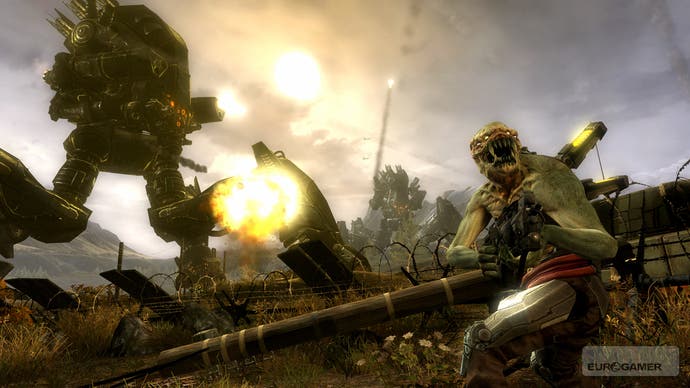
Other enemies are less successful, though. Furies are indestructible aquatic creatures that patrol submerged areas killing anyone who lingers in the water - a fairly crude way of keeping you on track. The same is true of the chameleon monsters that suddenly lunge towards you, shrouded in a Predator-style cloaking device. They're easily killed, but with little warning and another one-hit kill mechanic attached, they feel like a cheap shot used to strike up lazy scares, at odds with the more balanced and thoughtful design elsewhere.
For all its ability to surprise you with masses of enemies, the graphics engine doesn't always hold up under pressure either. There's a fair amount of clipping - one defeated Titan ended up half embedded in a warehouse before exploding messily - and it's reasonably common to find a lone Chimera stuck in a corner, obliviously trying to walk through a solid object. Such hiccupy moments tend to stand out all the more because of the extremely high graphical standard in general, and if you can forgive such lapses you're left with one of the best-looking games on the PS3.



